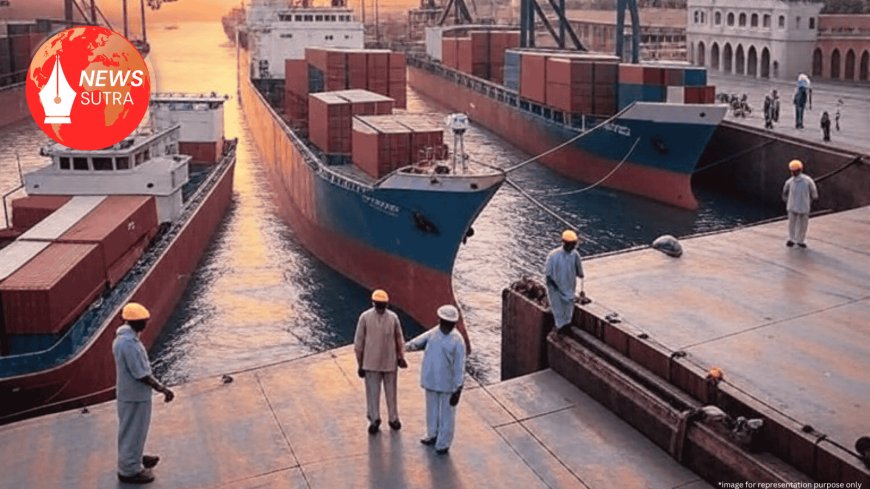Backdoor Trade Booms: India–Pakistan Unofficial Trade Hits 3-Year High Despite Diplomatic Freeze
Despite strained diplomatic ties, India–Pakistan unofficial trade via third countries like the UAE surged to a 3-year high in FY25, crossing $1.9 billion in value.

By Ronald Kapper
Published: July 6, 2025
New Delhi – In a development that has raised eyebrows across South Asian policy circles, unofficial trade between India and Pakistan has surged to a three-year high in FY2024–25, even as formal diplomatic and commercial ties remain suspended. According to trade analysts and research organizations, goods worth over $1.9 billion were exchanged indirectly, primarily routed through third countries like the United Arab Emirates (UAE), Singapore, and Afghanistan.
The rise in informal or “backdoor” trade—despite ongoing political tensions—highlights the strong economic interdependence between the two nuclear neighbors, as well as the limitations of current restrictions.
Understanding the Trade Freeze
India and Pakistan have had no formal bilateral trade since August 2019, when Pakistan suspended ties in response to India revoking Article 370 in Jammu & Kashmir. Both sides stopped issuing trade licenses, banned direct movement of goods, and withdrew Most Favored Nation (MFN) status. Since then, only limited humanitarian and medical aid exchanges have occurred.
Despite these measures, market demand and supply gaps have created incentives for traders on both sides to reroute their commerce through third-party nations—effectively bypassing official channels.
According to the Observer Research Foundation (ORF), FY25 saw a 33% increase in goods of Indian origin making their way into Pakistani markets via Dubai and Singapore. Similarly, Pakistani textiles, spices, and surgical instruments found buyers in India through re-export hubs.
Top Commodities Traded via Third Countries
From India to Pakistan (via UAE/Singapore):
-
Pharmaceuticals & generic medicines
-
Machinery and auto parts
-
Tea, spices, and processed food
-
Chemicals and dyes
From Pakistan to India (via UAE/AF):
-
Basmati rice
-
Surgical equipment
-
Cotton yarn and textiles
-
Rock salt and dry fruits
Analysts from Gateway House: Indian Council on Global Relations note that re-export certificates are commonly used to mask the origin of goods. For example, Indian medicines sent to Dubai are repackaged and sold as “Emirati-origin” to Pakistani wholesalers.
Trade via Dubai: The “Neutral Ground”
The UAE has emerged as a key facilitator of this unofficial trade. With both India and Pakistan maintaining strong commercial links with Dubai, the city-state serves as a neutral logistics hub.
Data from the Dubai Chamber of Commerce shows a sharp rise in transshipment activity of Indian goods to Pakistan. In FY25 alone, over $1.2 billion worth of Indian goods were rerouted to Pakistan through Dubai free trade zones.
This triangular trade has led to increased logistics costs and time, but traders remain willing to bear the expense due to sustained demand.
“There’s a premium attached to Indian medicines and auto parts in Pakistan. Even with higher costs through Dubai, buyers find it worthwhile,” said Anita Mehra, a logistics consultant based in Mumbai.
Why the Trade Persists
Despite nationalist rhetoric on both sides, the underground economy thrives on pragmatism. Key factors driving this surge include:
-
Consumer demand: Pakistani markets rely heavily on Indian pharmaceuticals and food items. Indian buyers seek quality textiles and raw materials.
-
Cultural similarities: Shared tastes, festivals, and consumption patterns sustain demand for familiar products.
-
Entrepreneurial workarounds: Private traders have devised informal routes and paperwork to move goods despite official bans.
-
Third-country leeway: Nations like the UAE do not restrict re-exports between the two countries, as long as local rules are followed.
Economic Impact and Revenue Loss
Ironically, this informal trade is costlier and less regulated, leading to revenue losses for both governments. Without direct customs duties, inspection, or taxation, the trade benefits middlemen rather than national economies.
A report by the Centre for Policy Research (CPR) estimated that India and Pakistan lost a combined $240 million in customs revenue due to informal routing in FY25. Moreover, the lack of quality control opens the door to counterfeit goods and smuggling.
Diplomatic Silence, Business as Usual
Despite the trade surge, neither New Delhi nor Islamabad has signaled any move toward resuming formal trade talks. Political observers believe that both sides are reluctant to appear conciliatory, especially with upcoming elections in Pakistan and volatile security dynamics in the region.
Yet, many in the business and policy sectors argue that reviving structured trade ties could benefit both economies.
“Trade does not solve political disputes, but it builds confidence. Formalizing what is already happening informally could help reduce costs, improve standards, and promote peace through economic cooperation,” said Dr. Sanjay Baru, former economic advisor to the Prime Minister.
What’s Next: Possibility of Formal Re-engagement?
While political obstacles remain, track-II dialogues between business chambers and former diplomats are ongoing. The Federation of Indian Chambers of Commerce and Industry (FICCI) and Pakistan Business Council have both issued position papers urging governments to consider phased reopening of trade routes.
Some possible future pathways include:
-
Establishing a limited trade corridor for essential goods.
-
Resuming postal trade and cross-border exhibitions.
-
Creating a third-party verification system to ensure transparency.
Conclusion
The unexpected surge in unofficial India–Pakistan trade in FY25 underscores a deeper truth: economic needs often outlast political rivalries. While governments remain firm on their geopolitical positions, the business communities on both sides continue to find ways to connect—albeit through roundabout means.
Whether this informal trade eventually leads to formal re-engagement remains to be seen. But for now, it reflects the enduring logic of commerce, even in the face of frozen diplomacy.














